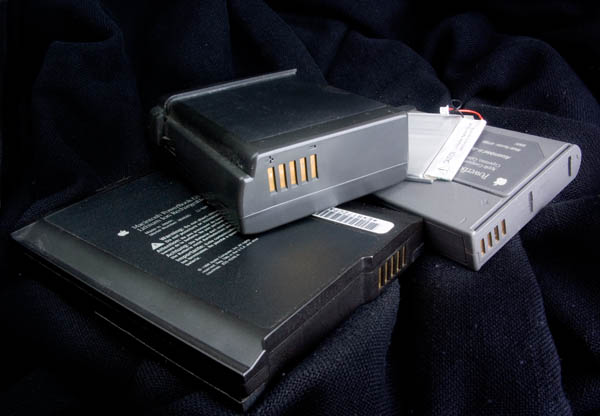BitDepth 477 - June 14
11/01/09 17:43 Filed in: BitDepth - June 2005
Keeping batteries out of the landfill remains one of the great challenges of waste disposal.
Poison pills in the watertable

Bringing out the dead. I don't even know where the large battery at the front came from. It must have been one of my charitable undertakings. Photo by Mark Lyndersay.
There's a battery in every device I use. Some of them are alkalines, others are based on nickel-cadmium technology and the most expensive ones are made from lithium. The only things they have in common are their capacity to generate electricity and the fact that every one of them is poisonous, a lethal container waiting to seep deadly and long lasting chemicals wherever they are left to rot.
Now I'm not an enthusiastic environmentalist. I have no problem with judiciously applied concrete and I have a long standing resistance to sprinkling water on plants; a legacy of too many forced interludes in my mother's lush gardens with a hose.
So if someone whose sole joy in gardening was trying to drown ants tells you that dumping batteries is a bad idea, then you should really think twice about doing it.
Rechargeable batteries reduce the flow of these discarded energy producers into the nation's dumps, but they replace that mass with fewer, more deadly batteries made of more deadly heavy metals.
Six years ago, I called Solid Waste Management and spoke with Stephen French there, trying to find out what to do with an old laptop battery I'd been using as a paperweight.
There wasn't any alternative to keeping paper in place in those days, but on Monday last week, SWMCOL as it's known these days, launched a battery recycling pilot project to coincide with World Environment Day and its theme, "Green Cities, A Plan for the Planet."
The week-long effort suffered some startup problems, and the bins got to service stations slowly. Mr French still works at SWMCOL, but he happily turned me over to Alban Scott, the company's Manager, Environmental Projects and a 27 year veteran of the war on waste.
According to Scott, this year's initiative came out of a meeting with an agent of a New Jersey recycler who was willing to take all the batteries that SWMCOL could ship for free.
After a programme last year for Environment Day that sought to gather glass, plastic and paper recyclables, Scott admits that the country's utilities are far from ready to handle recyclable materials even after people separate them for collection.
"We're trying to build awareness about the problem of common household waste in the public mind," says Scott of the dry-cell collection project. "This phase of the project lets people know about the dangers of dumping batteries and gives us an opportunity to gauge how many batteries we can collect."
The steps beyond this point are hazy. Getting people to replace one big bin with four or more smaller ones is an uphill battle that's yet to be engaged and the systems that gather separated recyclables and move them to appropriate recycling centres simply aren't in place. Nor, for that matter, are the recycling centres. New Jersey is a long way off and the US Government frowns on shipments of rubbish entering their shores.
Measure the gap between current reality and a future of respect for recyclables and, the distance from here to moving those waste products affordably to recyclers begins to look like a stroll along the Marianas Trench.
There's certainly an industry in preparing waste for recycling, but it's one with low to nonexistent margins that will depend on Governments in the region pooling their recyclable waste and realising the real but intangible value of keeping tons of unnecessary and truly toxic waste out of landfills and away from the watertable.
Recycling technology
SWMCOL works to apply what Scott described as the three "R's"; reduce, reuse and recycle. Here's how you can apply them to technology.
Reduce the volume of batteries and other technology waste by looking for alternatives to dumping. Try rechargeable batteries, which can save you money and reduce the used batteries your tech tools contribute to the country's waste. Then hold on to these deadlier energy producers for proper disposal.
Old computers can be useful to less demanding users, so consider donations that will enhance general computer literacy. Companies who make money selling brand-new computers could set aside some of those profits to support programmes to refurbish older systems for grateful new users.
Before tossing apparently useless computers and monitors into the waste skip behind the office, take the time to strip them for any useful parts first.
Tube based monitors are full of toxins, but can be useful in server rooms where colour accuracy and even sharpness aren't critical.
Dry-cell batteries aren't large, so establish a small box to capture them, particularly in corporate environments. I've been holding on to three laptop batteries and an iPod battery for years now waiting for SWMCOL's drycell bins.

Bringing out the dead. I don't even know where the large battery at the front came from. It must have been one of my charitable undertakings. Photo by Mark Lyndersay.
There's a battery in every device I use. Some of them are alkalines, others are based on nickel-cadmium technology and the most expensive ones are made from lithium. The only things they have in common are their capacity to generate electricity and the fact that every one of them is poisonous, a lethal container waiting to seep deadly and long lasting chemicals wherever they are left to rot.
Now I'm not an enthusiastic environmentalist. I have no problem with judiciously applied concrete and I have a long standing resistance to sprinkling water on plants; a legacy of too many forced interludes in my mother's lush gardens with a hose.
So if someone whose sole joy in gardening was trying to drown ants tells you that dumping batteries is a bad idea, then you should really think twice about doing it.
Rechargeable batteries reduce the flow of these discarded energy producers into the nation's dumps, but they replace that mass with fewer, more deadly batteries made of more deadly heavy metals.
Six years ago, I called Solid Waste Management and spoke with Stephen French there, trying to find out what to do with an old laptop battery I'd been using as a paperweight.
There wasn't any alternative to keeping paper in place in those days, but on Monday last week, SWMCOL as it's known these days, launched a battery recycling pilot project to coincide with World Environment Day and its theme, "Green Cities, A Plan for the Planet."
The week-long effort suffered some startup problems, and the bins got to service stations slowly. Mr French still works at SWMCOL, but he happily turned me over to Alban Scott, the company's Manager, Environmental Projects and a 27 year veteran of the war on waste.
According to Scott, this year's initiative came out of a meeting with an agent of a New Jersey recycler who was willing to take all the batteries that SWMCOL could ship for free.
After a programme last year for Environment Day that sought to gather glass, plastic and paper recyclables, Scott admits that the country's utilities are far from ready to handle recyclable materials even after people separate them for collection.
"We're trying to build awareness about the problem of common household waste in the public mind," says Scott of the dry-cell collection project. "This phase of the project lets people know about the dangers of dumping batteries and gives us an opportunity to gauge how many batteries we can collect."
The steps beyond this point are hazy. Getting people to replace one big bin with four or more smaller ones is an uphill battle that's yet to be engaged and the systems that gather separated recyclables and move them to appropriate recycling centres simply aren't in place. Nor, for that matter, are the recycling centres. New Jersey is a long way off and the US Government frowns on shipments of rubbish entering their shores.
Measure the gap between current reality and a future of respect for recyclables and, the distance from here to moving those waste products affordably to recyclers begins to look like a stroll along the Marianas Trench.
There's certainly an industry in preparing waste for recycling, but it's one with low to nonexistent margins that will depend on Governments in the region pooling their recyclable waste and realising the real but intangible value of keeping tons of unnecessary and truly toxic waste out of landfills and away from the watertable.
Recycling technology
SWMCOL works to apply what Scott described as the three "R's"; reduce, reuse and recycle. Here's how you can apply them to technology.
Reduce the volume of batteries and other technology waste by looking for alternatives to dumping. Try rechargeable batteries, which can save you money and reduce the used batteries your tech tools contribute to the country's waste. Then hold on to these deadlier energy producers for proper disposal.
Old computers can be useful to less demanding users, so consider donations that will enhance general computer literacy. Companies who make money selling brand-new computers could set aside some of those profits to support programmes to refurbish older systems for grateful new users.
Before tossing apparently useless computers and monitors into the waste skip behind the office, take the time to strip them for any useful parts first.
Tube based monitors are full of toxins, but can be useful in server rooms where colour accuracy and even sharpness aren't critical.
Dry-cell batteries aren't large, so establish a small box to capture them, particularly in corporate environments. I've been holding on to three laptop batteries and an iPod battery for years now waiting for SWMCOL's drycell bins.
blog comments powered by Disqus

